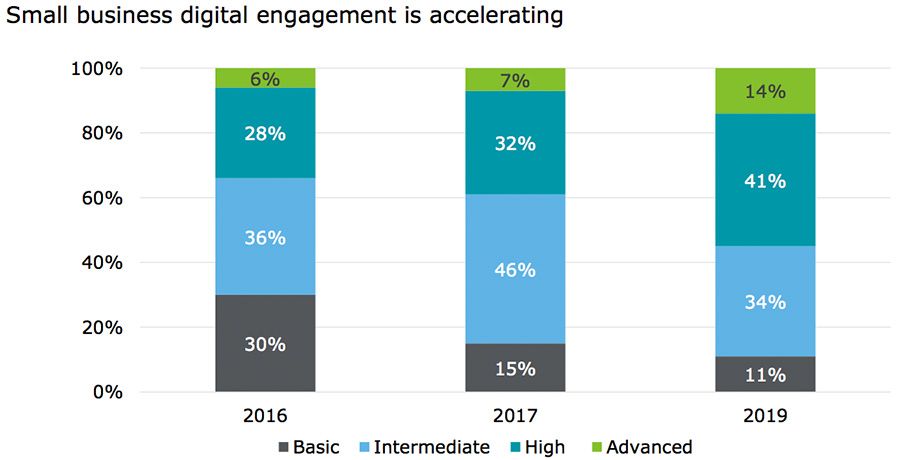A new report by Deloitte highlights that the small and medium enterprise (SME) segment in the Australian economy is growing its digital maturity, with the uptake bringing in a range of benefits to their operations. More than half of the SME sector is now at a ‘high’ or even ‘advanced’ level of digital engagement.
Perceptions around digital integration have been mixed, not only in Australia but across the world. For the SME sector, the biggest hindrance to digital engagement has traditionally been the high costs involved. In Australia, some businesses have been weary of the extra risks that digital engagement brings with it, and this concern has outweighed the perceived benefits.
Deloitte’s latest overview of the digital landscape in Australia’s SME sector reveals that most businesses appear to be powering through these obstacles to engage with the digital sphere, in line with the rest of the Australian market. However, according to Deloitte, the level of digital engagement is crucial to determining the actual value that this can generate for a business.
To crystalise the varying levels of benefit, the Big Four accounting and advisory firm outlined four levels of digital engagement among SMEs, namely ‘Basic,’ ‘Intermediate,’ ‘High,’ and ‘Advanced.’ Quoting the report, SMEs in the ‘Basic’ category are ‘businesses who only have a business email address and use traditional methods of marketing (e.g. post, newspapers). No social media or website,’ according to the firm.
The ‘Intermediate’ category consists of ‘Businesses who have a website, and may also be listed on an online marketplace or third-party e-commerce platform (e.g. eBay). Some use of social media and basic online marketing (e.g. webpage ad banners).’
SMEs with a ‘High’ level of digital engagement are, ‘businesses with a mobile-responsive website, which may also have e-commerce or booking capabilities. Extensive use of social media and higher level online marketing methods (e.g. search engine optimization, search engine marketing).’
Lastly, the ‘Advanced’ category in the report refers to ‘businesses that use data analytics to analyse customer information and inform decisions. Use of advanced online marketing tools such as search engine marketing, social media advertising, and video advertising.’ The distribution across all these categories is becoming increasingly promising.
As per Deloitte’s analysis, 55% of the SMEs in Australia are currently at either a ‘High’ or an ‘Advanced’ level of digital engagement. In 2017, this figure stood at just under 40%. Among those who have worked on increasing their digital engagement levels, the firm reports that the benefits have been significant.
Those who have moved from the ‘Basic’ to the ‘Advanced’ category in recent years have seen their revenue per employee increase by as much as 60%, while their overall revenue growth has increased by nearly 30% over the last year. Those who have not worked on increasing their digital engagement are unaware of these potential benefits.
According to Partner John O’Mahonnny, a partner at Deloitte Access Economics, these businesses are likely to struggle in the near future. “Different businesses will engage with digital in different ways, but to do so only a basic or intermediate level, risks lost opportunity, stagnation and even failure in the face of competition,” explains O’Mahonny.
For some, however, it is not the lack of awareness that prevents digital engagement, but the high costs involved. Costs remain the biggest barrier to digital engagement for SMEs, according to Deloitte. Nevertheless, the overall outlook is promising, which bodes well for the Australian economy as a whole.
Small and medium enterprises are the backbone of the Australian economy. Last year, the segment contributed more than $390 billion the country’s gross domestic output, a figure that continues to rise.

